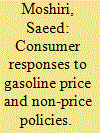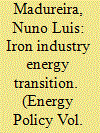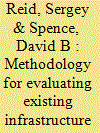|
|
|
Sort Order |
|
|
|
Items / Page
|
|
|
|
|
|
|
| Srl | Item |
| 1 |
ID:
171369


|
|
|
|
|
| Summary/Abstract |
Gasoline consumption in emerging economies have been rising rapidly due to economic growth and increasing urbanization rate in recent years. However, the development has brought about new socio-economic and environmental challenges leading governments to adopt various policies to control the trend. Although the impacts of price changes on gasoline consumption are well-researched in the literature, studies on different policies in a specific country is limited. In this paper, we investigate the impact of three distinct policies (price reform, rationing, and fuel-efficiency) on consumer responses in Iran. We estimate price, income, and efficiency elasticities across household characteristics, income groups, and provinces using the AIDS model and the household expenditures data for the period 2005–2016. The results show that the average price elasticity is -76, however, it varies across household characteristics, time, and space. The price responses are greater in provinces neighbouring the countries with high price differentials and welfare losses of price reform are more sever for lower income families. The estimated elasticities under different policy regimes show that energy price reform has led to significantly higher elasticities, while rationing has led to decreased elasticities. The more stringent efficiency regulation and increasing imports of fuel-efficient cars have also increased elasticities.
|
|
|
|
|
|
|
|
|
|
|
|
|
|
|
|
| 2 |
ID:
109409


|
|
|
|
|
| Publication |
2011.
|
| Summary/Abstract |
Operational and mission efficiency were estimated for Air Force fighters, bombers and transports from fuel use data from 2001 through 2008 as reported in the Air Force Total Cost of Ownership (AFTOC) database. This analysis estimated efficiency in terms of the best performance theoretically possible for each platform based upon the energy available in the fuel expended. Operational efficiency considered aircraft operations in general, without regard for the type of mission. Mission efficiency only considered use of allocated fuel for combat (non-training) sorties. The cost associated with fuel inefficiency of the combined fighter, bomber and tanker force were estimated based on the fiscal year 2008 costs of fuel, fully burdened to include the cost of aerial refueling. The total cost of operational inefficiency was estimated at $5 billion per year. The fully burdened cost of mission inefficiency added an additional $3.6 billion for a total per year cost estimate of $8.6 billion. This represents 21.5% of the $40 billion portion of the 2009 budget dedicated to modernization. A business case for force-structure change is presented, which describes how these cost savings can be leveraged for modernization.
|
|
|
|
|
|
|
|
|
|
|
|
|
|
|
|
| 3 |
ID:
169904


|
|
|
|
|
| Summary/Abstract |
This paper explores how gasoline prices affect the sales of new and used cars in Lebanon. Using a rich dataset on monthly imported cars from 2000 to 2016, a vector autoregressive analysis is used to model different consumer choices between fuel-efficient cars, midsize cars, and fuel-inefficient cars. We report the first empirical evidence on this question from the Middle East and North Africa (MENA) region using individual automobile data. We use within sample and out-of-sample tests to examine whether gasoline prices influence the sale of fuel-efficient cars. Our results show evidence against the hypothesis that rising gasoline prices shift consumers’ demand toward the most fuel-efficient cars.
|
|
|
|
|
|
|
|
|
|
|
|
|
|
|
|
| 4 |
ID:
162927


|
|
|
|
|
| Summary/Abstract |
This paper empirically examines the factors influencing consumers’ choices concerning the purchase of hybrid electric vehicles (HEVs). In addition, the paper investigates whether purchasing HEVs causes a rebound effect through which purchasers of HEVs increase their annual vehicle mileage. The results suggest that consumers who are more attentive to fuel economy may be inclined to choose HEVs. Moreover, the existence of the direct rebound effect is confirmed by the finding that the purchase of an HEV leads to an increase in annual mileage per household. Greater mileage increases future fuel cost savings from using an HEV relative to a conventional vehicle, and thus potentially leads to increased fuel cost savings that offset the extra cost of choosing an HEV. However, if the purchase of HEVs leads to a considerable increase in annual mileage, overall annual automotive CO2 emissions per household may be significantly increased by using HEVs.
|
|
|
|
|
|
|
|
|
|
|
|
|
|
|
|
| 5 |
ID:
091520


|
|
|
|
|
| Publication |
2009.
|
| Summary/Abstract |
This paper analyzes trends in the technological profile of the Austrian personnel vehicle fleet from 1990 to 2007. This includes the parameters of power, engine size and weight, which beyond the technological efficiency of the motor engine itself, are considered to be the main determinants of the fuel efficiency of the average car stock. Investigating the drivers of ever rising transport related greenhouse gas emissions is crucial in order to derive policies that strive towards more energy-efficient on-road passenger mobility. We focus on the efficacy of technological efficiency improvements in mitigating climate-relevant emissions from car use in light of shifting demand patterns towards bigger, heavier and more powerful cars. The analysis is descriptive in nature and based on a bottom-up database that was originally collated for the purpose of the present study. Technological data on car models, which includes tested fuel consumption, engine size, power and weight, is related to registered car stock and, in parts, to newly registered cars. From this, we obtain an original database of the Austrian passenger car fleet, i.e. information on consumer choice of specific car models, segregated by gasoline and diesel fuelled engines. Conclusions are derived for policies aimed at reducing the fossil fuel consumption of the moving vehicle fleet in order to contribute to a low carbon society.
|
|
|
|
|
|
|
|
|
|
|
|
|
|
|
|
| 6 |
ID:
088989


|
|
|
|
|
| Publication |
2009.
|
| Summary/Abstract |
This article documents and analyzes the changes in fuel efficiency of vehicles on US roads between 1923 and 2006. Information about distances driven and fuel consumed was used to calculate the on-the-road fuel efficiency of the overall fleet and of different classes of vehicles. The overall fleet fuel efficiency decreased from 14 mpg in 1923 to 11.9 mpg in 1973. Starting in 1974, efficiency increased rapidly to 16.9 mpg in 1991. Thereafter, improvements have been small, with efficiency reaching 17.2 mpg in 2006. The information for 2006 was used to calculate the fuel-efficiency improvements in different classes of vehicles that would be needed to achieve a given percentage reduction in the total amount of fuel consumed by all vehicles.
|
|
|
|
|
|
|
|
|
|
|
|
|
|
|
|
| 7 |
ID:
115653


|
|
|
|
|
| Publication |
2012.
|
| Summary/Abstract |
Energy related Principal-Agent (PA) problems cause inefficient combinations of investment, operating costs, and usage behavior. The complex market structure of the trucking industry contributes to split incentives because entities responsible for investments in energy efficiency do not always pay fuel costs and drivers are often not rewarded for fuel-efficient operation. Some contractual relationships exist in the trucking industry that hinder responses to fuel price signals. Up to 91% of total trucking fuel consumption in the U.S. is affected by "usage" PA problems, where the driver does not pay fuel costs and lacks incentive for fuel saving operation. Approximately 23% of trailers are exposed to an "efficiency problem" when owners of rented trailers do not pay fuel costs and therefore have little incentive to invest in efficiency upgrades such as improved trailer aerodynamics and reduced tire rolling resistance. This study shows that PA problems have the potential to significantly increase fuel consumption through avoided investments, insufficient maintenance, and fuel-wasting practices. Further research into the causes and effects of PA problems can shape policies to promote better alignment of costs and benefits, leading to reduced fuel use and carbon emissions.
|
|
|
|
|
|
|
|
|
|
|
|
|
|
|
|
| 8 |
ID:
091527


|
|
|
|
|
| Publication |
2009.
|
| Summary/Abstract |
In response to threats posed to the future supply of energy and to the environment, the G8 leaders, in Gleneagles, UK in 2005, agreed to an initiative called the Gleneagles Plan of Action (GPOA) which addresses climate change, clean energy and sustainable development. In the GPOA, G8 leaders pledged to encourage the development of cleaner, more efficient and lower-emitting vehicles, and to promote their deployment by, among other means, asking the IEA to review existing standards and codes for vehicle efficiency and to identify best practices.
In order to properly response to the above-mentioned requests from G8 leaders, the IEA has launched, among other activities, study on policies for "transforming the way we use energy" focusing on end-use efficiency including the one in transport sector and made a comprehensive response to the GPOA at the 2008 G8 Summit Meeting in Japan with 25 recommendations on energy efficiency. Regarding these recommendations, the G8 leaders have proclaimed, in the G8 Hokkaido Toyako Summit Leaders Declaration, that they would maximize implementation of the IEA's 25 recommendations.
|
|
|
|
|
|
|
|
|
|
|
|
|
|
|
|
| 9 |
ID:
110418


|
|
|
|
|
| Publication |
2011.
|
| Summary/Abstract |
This paper investigates the impact of improved fuel efficiency and road network expansion on motor vehicle travel using a system dynamic panel data estimator and panel data at the state level for the 2001-2008 period. Our model accounts for endogenous changes in fuel efficiency, congestion, fuel cost per mile, and vehicle stock. Our regression results suggest that the short run rebound effect is 0.0276 while the long run rebound effect is 0.11. The short run effect of road capacity per capita is 0.066 while the long run effect is 0.26.
|
|
|
|
|
|
|
|
|
|
|
|
|
|
|
|
| 10 |
ID:
116691


|
|
|
|
|
| Publication |
2012.
|
| Summary/Abstract |
This article examines the energy transition in the iron industry and studies the consequence of this switch to coal-fueling technology upon forests: what happens to long-lived energy carriers when a new source of heat and power makes significant inroads into their own markets? What factors underpin the substitution of older raw materials by new ones? The major lesson to be drawn from the iron industry energy transition points to the fact that within the "transitional" time-frame one may expect either the effective substitution of the older energy carrier or incentives to its actual expansion.
|
|
|
|
|
|
|
|
|
|
|
|
|
|
|
|
| 11 |
ID:
150768


|
|
|
|
|
| Summary/Abstract |
Recent U.S. state and federal legislation have been implemented with the intent of promoting the diffusion of plug-in electric vehicles (PEVs). Meanwhile, the federal government has passed new regulation aimed at increasing fuel efficiency standards of gasoline powered vehicles in order to reduce greenhouse gas emissions. In this paper, we examine the existing barriers that impact PEV diffusion. We argue that increased fuel efficiency standards coupled with declining gasoline prices conflicts with the implemented PEV incentives. Using a geospatial method, we demonstrate how policymakers can create regionally weighted markets based on consumer surveys to facilitate the development of a national policy for nascent products like the PEVs.
|
|
|
|
|
|
|
|
|
|
|
|
|
|
|
|
| 12 |
ID:
030225


|
|
|
|
|
| Publication |
New Delhi, National Productivity council of India, 1970.
|
| Description |
xix, 395p.Hbk
|
|
|
|
|
|
|
|
|
|
|
|
Copies: C:1/I:0,R:0,Q:0
Circulation
| Accession# | Call# | Current Location | Status | Policy | Location |
| 010748 | 662.622/NAT 010748 | Main | On Shelf | General | |
|
|
|
|
| 13 |
ID:
092742


|
|
|
|
|
| Publication |
2009.
|
| Summary/Abstract |
Transportation within the EU, as in most of the industrialized world, shows an increasing trend in CO2 emissions. This calls for measures to decrease the amount of transportation but also to increase the efficiency in the vehicle fleet. To achieve this, numerous policy measures are available, all of which targets the agents in the economy in various ways. Policy makers thus face a highly complex task. The present paper aims at providing a simple and transparent analytical model that illustrates how different policy measures address different parts of an interlinked system, which determines the composition of the future car fleet. Apart from being simple, and thereby providing an intuitive framework, the model provides important lessons for policy design, e.g., through highlighting the difference between initial responses to policies and the outcome in equilibrium both in the short and the long run.
|
|
|
|
|
|
|
|
|
|
|
|
|
|
|
|
| 14 |
ID:
176651


|
|
|
|
|
| Summary/Abstract |
Trucks in North America account for more than 23% of the transportation sector's greenhouse gas emissions. Truck platooning and truck electrification are potential technologies for reducing emissions and operating cost. However, adoption uncertainties result in speculations about their potential impact. Traditional modeling techniques to inform policymaking use large datasets, trained professionals to calibrate complex software, and take hours to run a single scenario. This paper provides a closed-form model that rapidly calculates trends of the potential national petroleum consumption reduction for a range of technology adoption scenarios. The primary finding is that truck electrification would have a substantially larger impact on fuel consumption reduction than platooning. The limitations of platoonable miles create an upper bound in benefits. When calibrated for the base year fuel-efficiency, the model shows that petroleum consumption reduction would be less than 4% at full adoption of platooning. The electrification of single unit trucks results in more than a 13-fold reduction of national petroleum consumption relative to platooning. However, without the electrification of combination unit trucks, petroleum consumption will eventually begin to increase again. Therefore, policies to encourage the reduction of greenhouse gas emissions should not overlook incentives to electrify combination unit trucks.
|
|
|
|
|
|
|
|
|
|
|
|
|
|
|
|
| 15 |
ID:
150871


|
|
|
|
|
| Summary/Abstract |
In this paper, we analyzed how the CAFE standard has affected improvements in the fuel economy of vehicles, as examined in other preceding studies, but in addition, we also analyzed how these standards have affected the level of consumer interest in fuel economy. Our goal was to determine what effects the government intervention has had on consumers, and whether such intervention ought to be continued. The results showed that not only has the CAFE standard had a direct and significant impact on improving fuel economy and increasing the market share of fuel-efficient vehicles, it has also boosted the development of technologies for enhancing fuel economy and raised consumer interest in fuel economy, thus indirectly contributing to overcoming market failure. The significance of this study is that we used publically available observed data and analyzed the recent impact of the CAFE standard specifically with a focus on the behavior and strategies exhibited by consumers and automakers. Another significance of this study is that it extends our purview to examine the effects that the CAFE standard has had in other countries (Korea).
|
|
|
|
|
|
|
|
|
|
|
|
|
|
|
|
| 16 |
ID:
175908


|
|
|
|
|
| Summary/Abstract |
Increasing biofuel production over the last decade and biofuel policies in Brazil, the European Union, and the United States have changed the global agricultural landscape in terms of land-use, commodity prices, and trade. Increasing fuel efficiency and electrification of the vehicle stock is projected to lower gasoline, diesel, and biofuel demand in the future. In this analysis, we quantify the effects of a 30% reduction in ethanol consumption in the U.S. and the European Union triggered by higher vehicle fleet fuel efficiency on global agricultural markets. Our results show decreases in global commodity prices by 1.9%–6.6% and a slight decrease in global cropland by 0.3%. Major changes occur in trade patterns with U.S. corn exports increasing by 30.3%. Global greenhouse gas emissions are lower due to the overall reduction in cropland. Gasoline and diesel consumption of the vehicle fleet is not changing rapidly but is a long-term process because vehicles are on average in operation for 10 or more years. Consequently, there are important long-term policy implications from changes in fuel efficiency requirements or ethanol blending limits that affect commodity prices, trade, and greenhouse gas emissions.
|
|
|
|
|
|
|
|
|
|
|
|
|
|
|
|
|
|
|
|
|